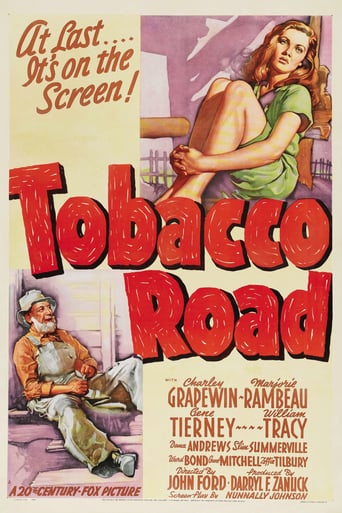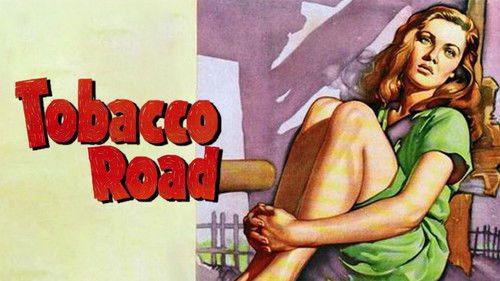wes-connors
In rural Georgia, during the Great Depression, lazy farmer Charley Grapewin (as Jeeter Lester) plans to be prosperous once more, but prospects appear bleak. He and his hillbilly family steal turnips for food and try to figure out ways to raise money. Marrying off toothless young son William Tracy (as Dude) to matronly Christian Marjorie Rambeau (as Bessie Rice) is one plan, but she spends her savings on a car. At age 23, dirty sexpot Gene Tierney (as Ellie May) is too old to marry off. Erskine Caldwell's "Tobacco Road" was, as mentioned in the film's introduction, one of Broadway's most successful plays. This annoying adaptation was directed by John Ford, who shows that a filmmaker at the height of his art could still stumble.**** Tobacco Road (2/20/41) John Ford ~ Charley Grapewin, Marjorie Rambeau, William Tracy, Gene Tierney
ferbs54
In the 1940 John Ford masterpiece "The Grapes of Wrath," Charley Grapewin played a Depression-era Okie patriarch who dies after being forcibly evicted from the land on which his Joad family had lived for generations. The following year, in Ford's "Tobacco Road," Grapewin enjoyed a much larger role, playing a somewhat similar character. Here, he played Jeeter Lester, the lazy, shiftless head of a "poor white trash" family in Depression-era rural Georgia that is about to be evicted from its ancestral abode. Based on Jack Kirkland's 1933 stage play (the longest-running Broadway show at the time, as the film's opening credits tell us), which was itself based on an Erskine Caldwell novel, "Tobacco Road" gives us a typical week in the life of the Lesters. We meet Jeeter and his put-upon wife Ada (Elizabeth Patterson), borderline retarded son Dude (William Tracy) and imbecilic daughter Ellie May (Gene Tierney, in her third film). Desperate for food, the poverty-stricken Jeeter steals a bag of turnips from his son-in-law Lov (Ward Bond), who is having major troubles with his 13-year-old wife but spurns the fawning attentions of 23-year-old Ellie May because she's just too durn old! Dude eventually marries a woman a good 20 years older than himself, a nearby evangelist named Sister Bessie (Marjorie Rambeau), only because she has promised to buy him a car with a horn to toot (Dude, for some reason, has a horn fixation!). This $800 automobile, however, gives our man Jeeter some big ideas on how he might raise the $100 he needs to save his land....I must confess that on my initial viewing of this film, I was somewhat appalled at the cracker-barrel inanity of some of the proceedings. Played mainly for laughs, the picture struck me much more favorably on a repeat viewing. Grapewin is a marvel in his role of Jeeter, giving practically an Oscar-worthy performance, Ford's direction is typically sensitive and impeccable, and DOP Arthur C. Miller's lensing is just beautiful, never more so than in the scene where the Lesters walk to the poor farm amidst falling leaves. (Miller would deservedly win an Oscar for his work on that same year's "How Green Was My Valley.") Screenwriter Nunnally Johnson's script is very amusing, as well; he would go on, 13 years later, to write the script for the Gene Tierney film "Black Widow." And speaking of Gene (my main reason for renting this film in the first place), in her 1979 autobiography "Self-Portrait," she tells us that she "was sprayed each morning with a thin coat of oil--over my arms, legs, and face--after which dirt was rubbed on" to achieve her begrimed character's look in this film. She also mentions that she was so embarrassed by the idiot-seduction scenes with Bond that she had to ask Ford to clear the set when these were shot. Gene is wonderful as always here, but, sadly, only gets to utter six lines of dialogue, all told. "Tobacco Road" was her first film with Dana Andrews (playing a kindly, normal neighbor of the Lesters, who almost seems to be of a different species!), although they share no scenes together; the two would go on to appear in "Belle Starr," "Laura" (the classiest of film noirs), "The Iron Curtain" and "Where the Sidewalk Ends." The Lester family is referred to as "just naturally trifling" by a police chief during the course of this film, but the picture itself is hardly a trifling affair. Though certainly not the classic that is "The Grapes of Wrath," it is nevertheless an artful picture, featuring some wonderful performances and amusing moments, ultimately leaving us with a sense of sadness regarding these poor folk who are now "gone with the wind (hmm, where have I heard THAT line before?) and the dust...."
eminges
By sheer chance, I happened to get hold of copies of three difficult-to- find DVD's within about a month of each other: Tobacco Road, Tortilla Flat, and Song of the South (this is the 21st century, kids, EVERYTHING is available if you look hard enough).What a nasty insight into the mindset of America in the 1940's: let's all us respectable white folk rush to buy tickets to see darkies, white trash, and wetbacks demean themselves. Here's a quick test to see if you want to hunt this particular vile artifact of our politically incorrect past down: do you think Gene Tierney rolling around in the dirt trying (unsuccessfully) to get a genetic defective to come over and give her a little pleasurin' is A) side-splittingly hilarious B) stomach-wrenching? If your sides aren't already aching with laughter, pass.
Lechuguilla
Dirt poor, elderly Georgia farmer Jeeter Lester (Charley Grapewin) schemes to get some money so that he and his wife Ada (Elizabeth Patterson) can remain at their dilapidated frame house on Tobacco Road, in this Great Depression era story, part comedy, part drama.As country hicks, most of the characters are rather too stereotyped to be realistic. The film's script is very talky, not surprising since the story originated as a stage play. The film's plot varies wildly from slapstick comedy to morose drama. And therein lies the main problem.Rural poverty in the South during the 1930s was no laughing matter. It was an intensely painful and prolonged episode of human misery. I can understand how viewers in those days needed some comic relief, but not in a story about poverty. The hyper-antics of young Dude, the film's comic relief, are extremely annoying. Those scenes dilute the seriousness of the film's underlying theme. And the subplot wherein Dude and Sister Bessie go off together seems like plot filler.Charley Grapewin gives a fine performance in the lead role. But Marjorie Rambeau as Sister Bessie, and William Tracy as Dude overact. Part of this overacting could have been the result of poor film direction.The film's background music runs the gamut from frivolous and nondescript in the comedic scenes to old-time gospel songs like "Shall We Gather At The River" during more serious moments.Given the era in which the film was made, "Tobacco Road" is okay, if you give it some slack. But the story would have been better without the slapstick comedy. In any event, it's a good movie to watch when you're depressed and think things can't get much worse.




